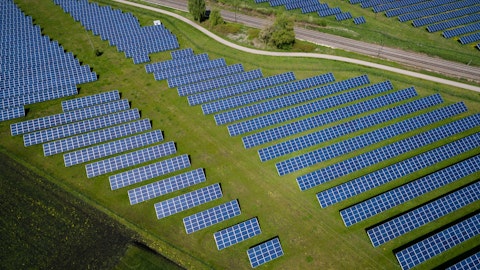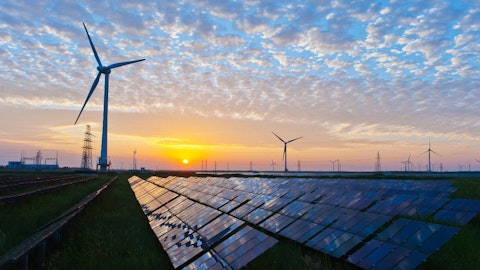Montauk Renewables, Inc. (NASDAQ:MNTK) Q3 2023 Earnings Call Transcript November 12, 2023
Operator: Good afternoon, everyone, and thank you for participating in today’s conference call. I would like to turn the call over to Mr. John Ciroli as he provides some important cautions regarding forward-looking statements and non-GAAP financial measures contained in earnings materials or made on this call. John, please go ahead.
John Ciroli: Thank you, John. Good day, everyone, and thank you for joining our call. During the third quarter of 2023, industry-wide D3 RIN generation decreased approximately 8% when comparing RIN generation in July 2023 to September 2023 as reported by the US EPA. This compares to an approximately 6.6% increase in industry-wide RIN generation from July 2022 to September 2022. We believe contributing factors to the Q3 2023 reduction in D3 RIN generation could include drought weather anomalies of lower-than-average rainfall and higher than average temperatures. As some of our production facilities experienced these weather anomalies and, as Kevin will explain more, our production during the third quarter of 2023 was similarly impacted.
In the third quarter of 2023, our Board of Directors approved funding for the first phase of our swine waste to renewable energy development initiative in North Carolina. Including the approximately $24 million of cumulative expenditures through Q3 2023, we currently expect the first phase total capital investment to range between $140 million and $160 million. We currently expect to have the first of eight processing reactor trains operational during the first half of 2024. We are currently planning for a rolling commissioning schedule for the remaining processing lines beginning in the second half of 2024 and continuing through the second half of 2025. We expect revenue generation to commence in 2025. Upon completion of this first phase of the project, we expect to have sufficient capacity to satisfy the Duke Energy REC contract through the deployment of up to eight of our patented reactors.
At first full phase processing capacity, we anticipate the ability to process feedstock from over 120,000 hog spaces per day, equating to over 200 tons of waste collection per day. The first phase of this project is expected to produce approximately 45,000 to 50,000 megawatt hour equivalents through a combination of 190,000 to 200,000 MMBtus and 25,000 to 30,000 megawatt hours. We also expect the first phase of the project will produce approximately 17,000 to 20,000 tons of charged soil enhancement annually. Related to our Pico dairy digestion capacity increase project, during the third quarter of 2023, we commissioned additional digestion capacity and our new reception pit. We have begun utilizing the increased reception pit capacity and have been working to increase gas availability through the additional digestion capacity.
We expect to commission the last expansion of our digestion capacity increase during the fourth quarter of 2023 that will be necessary to process the final tranche of increased feedstock. Our dairy host informed us they expected to deliver that final increase in feedstock volumes in 2025, at which time we will make the final contractual payments to the dairy. And with that, I will turn the call over to Kevin.
Kevin Van Asdalan: Thank you, Sean. I will be discussing our third quarter of 2023 financial and operating results. Please refer to our earnings press release and the supplemental slides that have been posted to our website for additional information. Total revenues in the third quarter of 2023 were $55.7 million, a decrease of $0.2 million or 0.3% compared to $55.9 million in the third quarter of 2022. The decrease is primarily related to a decrease in pricing of the gas commodity indices, which decreased 68.9% during the third quarter of 2023 as compared to the third quarter of 2022. Similarly, realized RIN prices decreased 12.6% to $3.05 in the third quarter of 2023 compared to $3.49 in the third quarter of 2022. Contributing to the revenue decrease are gains recognized in the third quarter of 2022 of $0.4 million related to a gas commodity hedge program that has since expired.
Offsetting these revenue decreases was an increase of 26.7% of RINs sold in the third quarter of 2023 as compared to the third quarter of 2022. Total general and administrative expenses for the third quarter of 2023 were $7.8 million, a decrease of $0.7 million or 8.2% compared to $8.5 million in the third quarter of 2022. The decrease was primarily related to a decrease of $0.7 million or 13.9% in employee-related costs, including stock-based compensation. Turning to our segment operating metrics, I’ll begin by reviewing our Renewable Natural Gas segment. We produced 1.4 million MMBtu of Renewable Natural Gas during the third quarter of 2023, a decrease of less than 0.1 million compared to 1.4 million MMBtus produced in the third quarter of 2022.
As Sean mentioned, industry D3 RIN generation decreased approximately 8% when comparing RIN generation in July 2023 to September 2023 as reported by the EPA. This compares to approximately 6.6% increase in RIN generation between July 2022 and September 2022. We believe contributing factors to this third quarter of 2023 reduction in industry D3 RIN generation could include drought weather anomalies of lower-than-expected rainfall and higher than average temperatures. These weather anomalies have impacted gas availability at certain of our RNG facilities during the third quarter of 2023. Also impacting our production were previously discussed second quarter of 2023 process equipment failures, which impacted the third quarter of 2023, but has since been repaired.
Revenues from the Renewable Natural Gas segment in the third quarter of 2023 were $50.9 million, a decrease of $3.4 million or 6.3% compared to $54.3 million in the third quarter of 2022. Average commodity pricing for natural gas for the third quarter of 2023 was $2.55 per MMBtu, 68.9% lower than the third quarter of 2022. During the third quarter of 2023, we self-monetized 13.8 million RINs, representing a $2.9 million increase or 26.7% compared to $10.9 million in the third quarter of 2022. Average realized pricing for RIN sales during the third quarter of 2023 was $3.05 as compared to $3.49 in the third quarter of 2022, a decrease of 12.6%. This compares to the average D3 RIN index price for the third quarter of 2023 of $3.01 being approximately 6.4% higher than the average D3 RIN index price in the third quarter of 2022.

At September 30, 2023, we had approximately 0.3 million MMBtus available for RIN generation and had approximately 0.8 million RINs generated and unsold. Of the RINs generated and unsold as of September 30, 2023, approximately $1.5 million in revenues will be recognized during the fourth quarter of 2023 as the transfer of ownership was not completed by the customer until after September 30, 2023. At September 30, 2022, we had approximately 0.4 million MMBtus available for RIN generation and had approximately 1.4 million RINs generated and unsold. Our profitability is highly dependent on the market price of environmental attributes, including the market price of RINs. Realized prices for environmental attributes monetized in the period may not correspond directly to index prices due to the forward selling of commitments.
We have not entered into significant forward sale commitments beyond the fourth quarter of 2023. We have entered into commitments to monetize all RINs expected to be generated during the fourth quarter of 2023 at an average price of $3.09. Our operating and maintenance expenses for our RNG facilities in the third quarter of 2023 were $11.9 million, a decrease of $0.2 million or 1.7% compared to $12.1 million in the third quarter of 2022. Our RNG facilities reported reduced utility expenses of approximately $1.5 million in the third quarter of 2023 as compared to the third quarter of 2022. Additionally, operating and maintenance expenses at our RNG facilities increased approximately $1.2 million in the third quarter of 2023 as compared to the third quarter of 2022 as a result of facility preventative maintenance, repairs and other well-field operational enhancements.
We produced approximately 48,000 megawatt hours of renewable electricity during the third quarter of 2023, a decrease of approximately 1,000 megawatt hours compared to 49,000 megawatt hours in the third quarter of 2022. Our Bowerman facility produced approximately 3,000 megawatt hours less in the third quarter of 2023 compared to the third quarter of 2022 due to higher ambient temperatures in the third quarter of 2023. Our security facility produced approximately 2,000 megawatt hours more in the third quarter of 2023 compared to the third quarter of 2022 due to engine maintenance completed in 2022. Revenues from renewable electricity facilities in the third quarter of 2023 were $4.8 million, an increase of $0.4 million or 9.2% compared to $4.4 million in the third quarter of 2022.
The increase is primarily driven by an increase in our security facility production volumes and the timing of the generation and monetization of RECs at our Bowerman facility. Our renewable electricity generation operating and maintenance expenses in the third quarter of 2023 were $2.2 million, an increase of $0.1 million or 4.8% compared to $2.1 million in the third quarter of 2022. The increase is primarily related to our Tulsa facility operating and maintenance expenses, which increased approximately $0.3 million as a result of scheduled engine preventative maintenance and well-field operational maintenance. Additionally, our Turkey Creek facility operating and maintenance expenses increased approximately $0.2 million as a result of non-capitalizable costs.
The increase was offset by a decrease of approximately $0.3 million at our Bowerman facility as a result of property tax refund received in the third quarter of 2023. We calculated and recorded an impairment loss of less than $0.1 million in the third quarter of 2023, a decrease of $2.2 million or 97.8% compared to $2.3 million in the third quarter of 2022. The impairments in the third quarter of 2023 were for specifically identified RNG machinery and equipment that were no longer in operational use. Other than this discrete event, we did not record any other impairments related to future cash flows. Operating income in the third quarter of 2023 was $16.8 million, an increase of $3.1 million or 23.1% compared to $13.6 million in the third quarter of 2022.
RNG operating income for the third quarter of 2023 was $24.1 million, a decrease of $2.7 million or 10.3% compared to $26.8 million in the third quarter of 2022. Renewable electricity generation operating income for the third quarter of 2023 was $0.7 million, an increase of $2.4 million or 141.9% compared to an operating loss of $1.7 million in the third quarter of 2022. Turning to the balance sheet; as of September 30, 2023, $66.0 million was outstanding under our term loan. The company’s capacity available for borrowing under the revolving credit facility was $117.5 million. During the nine months ended September 30, 2023, we generated $19.6 million of cash from operating activities, a decrease of $40.2 million or 67.3% compared to $59.8 million of cash provided by operating activities in the third quarter of 2022.
Of the RINs generated and unsold at September 30, 2023, approximately $1.5 million in deferred revenues was included in working capital as of September 30, 2023, as the transfer of ownership was not completed by the customer until October of 2023. For the nine months ended September 30, 2023, our capital expenditures were $45.4 million, of which approximately $12.3 million were related to the ongoing Pico facility digestion capacity increase, $9.6 million were related to the Montauk Ag Renewables project in North Carolina, $10.1 million were related to our second Apex RNG facility, $2.9 million were related to our Blue Granite RNG facility and $2.8 million were related to our Bowerman RNG project. As of September 30, 2023, we had cash and cash equivalents of approximately $73.7 million.
Adjusted EBITDA for the third quarter of 2023 was $22.4 million, an increase of $1.5 million or 7.4% compared to $20.9 million for the third quarter of 2022. EBITDA for the third quarter of 2023 was $22.4 million, an increase of $3.5 million or 18.2% compared to $18.9 million for the third quarter of 2022. Net income for the third quarter of 2023 increased approximately $1.7 million or 15.6% over the third quarter of 2022. And with that, I’ll turn the call back over to Sean.
Sean McClain: Thank you, Kevin. In closing, we would like to provide an updated full year 2023 outlook, driven by drought weather anomalies that are likely a leading cause of the industry reduction in D3 generation during the third quarter of 2023. And while we don’t provide guidance on our expectations of future environmental attribute prices, volatility in index prices does impact our revenue expectations. We currently expect RNG production volumes to range between 5.7 million and 5.8 million MMBtu. Corresponding RNG revenues are expected to range between $155 million and $160 million. We expect renewable electricity production volumes to range between 190,000 and 195,000 megawatt hours and corresponding renewable electricity revenues are expected to range between $17.7 million and $18.7 million. And with that, we will pause for any questions.
See also 12 Best Climate Change Stocks To Invest In and 10 Biggest Failed Companies Due To Poor Management.
Q&A Session
Follow Montauk Renewables Inc. (NASDAQ:MNTK)
Follow Montauk Renewables Inc. (NASDAQ:MNTK)
Receive real-time insider trading and news alerts
Operator: Thank you. [Operator Instructions] Our first question comes from the line of Ryan Pfingst with B. Riley. Your line is now open.
Ryan James: Hi, guys. Thanks for taking my question. Can you just talk about the decision to enter into commitments for all of your expected RIN generation in 4Q at 3.09%? Was that just out of an abundance of caution? And do you expect to enter into commitments in the near term for 2024, given the recent strength we’ve seen in index prices?
Sean McClain: Good question, Ryan. The philosophy that we have on RIN commitments is tied closer to our direct sales to obligated parties. We tried to avoid selling our RINs to any intermediaries and the timing at which we make those commitments is a cross between the strength of the pricing that we see, the abundance or absence of any news to the contrary that would suggest that those prices are abnormal and the demand interest from those obligated parties. And that’s the extent to which we make the decision on what we’ve monetized or committed for the fourth quarter. As far as the commitments into the upcoming year relative to the price strength, we don’t provide forward guidance in terms of commitments beyond our acknowledgment that we haven’t made any of those commitments in any material nature as of this point, but continue to evaluate it no differently than we have in previous quarters and in previous years, again, a combination of the price strength and the demand interest of the obligated parties under the renewable fuel standard.
Operator: [Operator Instructions] Our next question comes from the line of Craig Shere with Tuohy Brothers. Shere, your line is now open.
Craig Shere: Good afternoon. So my apologies, I’m jumping around between earnings calls. It looks like your third quarter was mostly in line, but you’re lowering RNG guidance for the year, which implies kind of a softer fourth quarter. Is this primarily relating to the drought issue impacting RNG production? Can you provide a little more color on what might make for a softer fourth quarter?
Kevin Van Asdalan: Yes. And Craig, that’s correct. Our third quarter was impacted by these weather anomalies significantly impacting our Ohio facilities and our Texas facilities. That’s a primary leading reason for the lowering of the top end of our 2023 guidance. And then I did want to note that our third quarter while in line, we did have a defer approximately $1.5 million in revenues from Q3 into Q4 that we normally would have obtained. But generally, the drought that we experienced for a prolonged period in our third quarter is the primary reason for the top end of that range being reduced from last quarter to this quarter.
Operator: Thank you. One moment for our next question please. Our next question comes from the line of Matthew Blair with Tudor, Pickering, Holt.
Matthew Blair: Hey, good afternoon. I was wondering if you had any thoughts on why D3 RIN generation appears to have slowed down recently. I think the year-to-date pace is around 17% growth rate, which obviously is pretty strong. But in recent months, it’s been much lower than that. And if you’re seeing that in your system or if you had any ideas on why things might be slowing down in that regard?
Kevin Van Asdalan: Yes, Matthew. I think as we disclosed, we believe that the weather, some less than average rainfall, higher than average temperatures, we believe that’s contributing it to the third quarter. And then while we still continue to review and try to glean information from our systems and information, we do believe that there is that continued growth in the voluntary offtake market as well. We’re aware of that voluntary offtake. We have a portion of our production that is sold under fixed pricing. We’re working to quantify that, but I believe it’s those two leading factors would be contributing to the falling RIN production that we’ve been seeing as an industry over the last handful of months.




